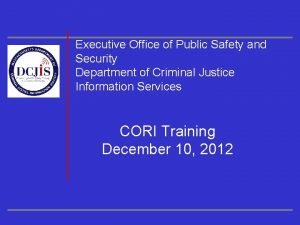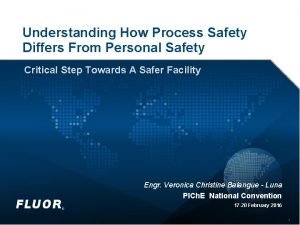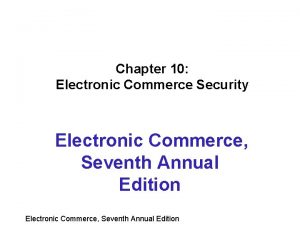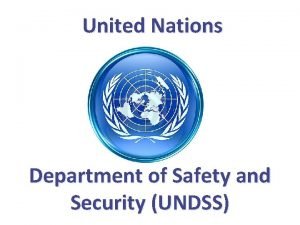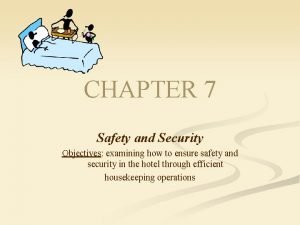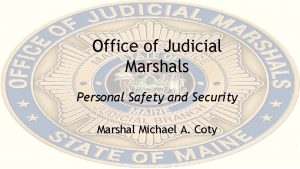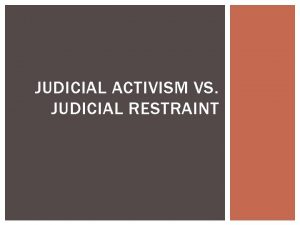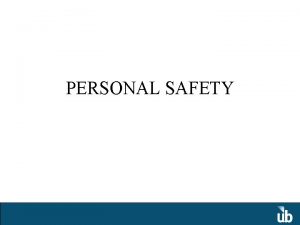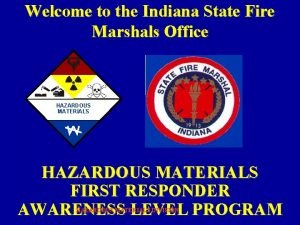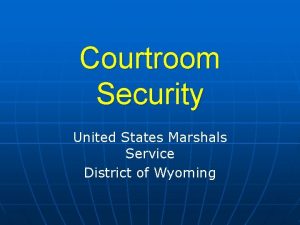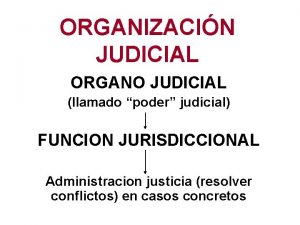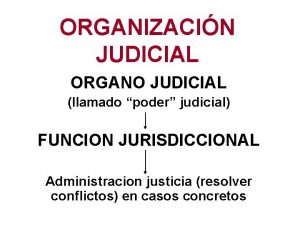Office of Judicial Marshals Personal Safety and Security















- Slides: 15

Office of Judicial Marshals Personal Safety and Security Marshal Michael A. Coty

Introduction • • (Who Is this Guy? ) Career Law Enforcement Executive Military Police 6 Years Patrol 15 Years as a Police Chief 4 Years as Public Safety Director 17 Years as Director of Judicial Marshals Past President of the Maine Chiefs of Police Association Life member of the International Police Chiefs Association

Why are We Here? (To help keep you safe. ) • The first person to realize you are in danger. • The first person that can react to your safety. • You are the first person responsible for keeping yourself safe. • Trust your instincts – tingly feeling – hair on the back of your neck. (“The Gift of Fear” – Gavin De Becker) • Trust your intuition – Perceptions we form at an early age may not always prove accurate.

Communication • Communication is always key to keeping yourself safe. • Confidentiality is important, but so is being safe • If you are ever in fear, tell someone immediately. • If you see something – say something.

When Working Away From the Office • Be prepared for the unexpected. Always have a plan “B”. • Be aware of your surroundings. (Is the same vehicle following you to or from work frequently? Do you recognize clients or family members in places you frequent going to or from work, Grocery store etc. ? ) • Don’t assume a chance encounter is always a coincidence. • Make sure someone else knows the routes you are traveling and times to expect you at, or back from, your destination.

When Working Away From the Office (Continued) • Make sure you have a phone and numbers you can call if you need help. A phone in your hand is easier to use than a phone in a purse or pocket. Don’t leave it on a table or counter where it can be grabbed. Use your I. C. E. feature on your phone. • Always report concerns to someone else that can help. • If something doesn’t feel right, trust your instincts and tell someone, get away or call for help. • Remember You are the first person responsible for your safety. If something doesn’t feel right, it probably isn’t. Get away, call for help, and keep yourself safe.

When Working Away From the Office Continued • Always leave distance between you and the vehicle in front of you for a lane to escape if you need to get out of traffic. • Always drive with the doors locked. (Especially in slow moving traffic. ) • When stopping at rest areas, park in well lit areas close to the facilities. If you park next to another vehicle pay attention to the vehicle. Is there anyone in the vehicle? If something doesn’t look right find another spot. • Avoid entering into conversations with strangers. (Be courteous but don’t volunteer information) • Do not meet clients late at night or in areas unfamiliar to you. Always meet on your terms.

Being Safe at Work • Keep locked or secure areas locked. (A secured area is only as safe as you let it be. ) • Only allow those with proper identification access. • Check with co-workers before allowing family members into secure areas. • Help keep unauthorized people from secure areas. Ask for identification or call for help. • Know where the duress alarms are and use them if you need to. • Be familiar with evacuation routes and where to go when you leave the building. • Know who to call for help. • If it is an emergency, call 911. In a courthouse push the closest duress alarm, or contact the closest Deputy Judicial Marshal.

Know your Coworkers • People are creatures of habit. When a relationship begins to fail there may be some telling signs to look for. • Has the persons attitude and demeanor changed significantly recently? • Is the change noticeable by others? • Have they changed the way they communicate? (Switching to written when they normally communicated verbally) • Are they withdrawn when they are normally outgoing? • Are they more agitated than normal? • Do situations that seem insignificant cause them anger or frustration? • Has their time and attendance changed from the normal? • These are all symptoms that someone may be having a difficult time dealing with daily situations and an intervention may be appropriate.

Safety at Home • No one knows your surroundings better than you. • If something doesn’t feel right, trust your instincts and tell someone, get away or call for help. • Watch for people in the area of your home that are not familiar to you. Do not hesitate to report suspicious activity. • Know your neighbors and be familiar with their routines. Are they usually out and about late or can you tell when they are home and when they are not? Do you know their vehicles, color make etc. • When going on vacation, cancel deliveries, mail, newspapers etc. • Have a friend, family member, or neighbor check on your property. • Some law enforcement agencies provide vacant property checks. • Make sure all doors and windows are locked. (Don’t forget the bulkhead)

Be Aware of Suspicious Behavior • Dressed for winter weather when the temperature is above 70 degrees. • Acting nervous or extremely excited over other people being near them. • Constantly looking around for other people as if they are trying to see who else may be able to see them. • Concealing their hands inside their clothing in some fashion. • Bulky areas on their clothing as if they are hiding something • Carrying bags, back packs, containers that they appear protective of or that they appear they want to leave some place. • Talking incoherently or saying words or phrases that do not seem to make sense.

Suspicious Behavior Continued • Avoiding eye contact and trying to hide their facial features in some manner. • Arguing or challenging others that may be in the same area as them. • When these signs are observed, contact your closest law enforcement agency by the quickest means possible. (They are trained to recognize mental illness and deal with aggressive/suspicious persons. )

Be A Good Witness ü ü ü ü Get descriptions written down as soon as possible. Is a weapon involved, if so can you describe it? Pick a reference point for height instead of trying to guess. Try and remember what is said and who said it. Did they have an accent or speech impediment? What is there attitude? Angry, excited, hysterical, etc. Follow directions of responding law enforcement.

In Summary • You are responsible for your own safety • Communication is the key • Trust your Instincts • If it doesn’t feel safe, it probably isn’t • Always have a plan “B” • Let someone know when you don’t feel safe.

Comments – Questions - Concerns Michael Coty, Director of Judicial Marshals (207) 557 -4088 mike. coty@courts. maine. gov
 Flag marshals
Flag marshals Judicial activism v. judicial restraint
Judicial activism v. judicial restraint Judicial restraint vs judicial activism
Judicial restraint vs judicial activism Judicial activism vs judicial restraint
Judicial activism vs judicial restraint Judicial activism vs judicial restraint
Judicial activism vs judicial restraint Judicial restraint vs judicial activism
Judicial restraint vs judicial activism Page 38
Page 38 Privatesecurity
Privatesecurity Personal safety vs process safety
Personal safety vs process safety Wireless security in cryptography
Wireless security in cryptography Security policy and integrated security in e-commerce
Security policy and integrated security in e-commerce Factory office plan
Factory office plan United nations department of safety and security
United nations department of safety and security Safety and security objectives
Safety and security objectives Care welfare safety and security
Care welfare safety and security Chemical safety and security
Chemical safety and security






